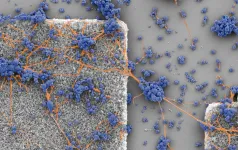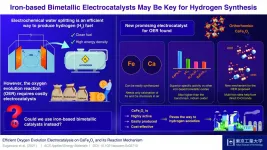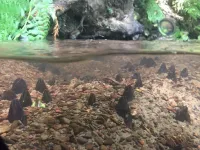(Press-News.org) A recent study of how human resources professionals review online information and social media profiles of job candidates highlights the ways in which so-called "cybervetting" can introduce bias and moral judgment into the hiring process.
"The study drives home that cybervetting is ultimately assessing each job candidate's moral character," says Steve McDonald, corresponding author of the study and a professor of sociology at North Carolina State University. "It is equally clear that many of the things hiring professionals are looking at make it more likely for bias to play a role in hiring."
For this study, the researchers conducted in-depth interviews with 61 human resources professionals involved in recruitment and hiring across many industries. Study participants ranged from in-house HR staff to executive recruitment consultants to professionals at staffing agencies.
"One of the things that cropped up repeatedly was that cybervetting not only judges people's behavior, but how that behavior is presented," says Amanda Damarin, co-author of the paper and an associate professor of sociology at Georgia State University. "For example, one participant noted that his organization had no problem with employees drinking alcohol, but did not want to see any photos of alcohol in an employee's social media feed.
"There's a big disconnect here. One the one hand, HR professionals view social media as being an 'authentic' version of who people really are; but those same HR professionals are also demanding that people carefully curate how they present themselves on social media."
"It was also clear that people were rarely looking for information related to job tasks - a point some study participants brought up themselves," McDonald says. "And the things they did look for reflected their explicit or implicit biases."
For example, study participants referenced looking for things like posts about hiking and family photos of Christmas. But most people who hike are white, and most people who post Christmas photos are Christians. Study participants also expressed a preference for online profiles that signaled "active" and "energetic" lifestyles, which could lead to discrimination against older or disabled job seekers.
And it was often unclear what job candidates could do to address concerns about bias in cybervetting. For example, while many study participants noted that putting a photo online created the opportunity for bias to affect the hiring process, other study participants noted that not having a "professional" profile picture was in itself a "red flag."
"Some workers have a social media profile that sends the right signals and can take advantage of cybervetting," McDonald says. "But for everyone else, they are not only at a disadvantage, but they don't even know they are at a disadvantage - much less why they are at a disadvantage. Because they don't necessarily know what employers are looking for."
"Some of the people we interviewed were very aware that cybervetting could lead to increased bias; some even avoided cybervetting for that reason," Damarin says. "But others were enthusiastic about its use."
Researchers say one of the key takeaways from the work is that there need to be clear guidelines or best practices for the use of cybervetting, if it is going to be used at all.
"The second takeaway is that the biases and moral judgments we are hearing about from these HR professionals are almost certainly being incorporated into software programs designed to automate the review of job candidates," McDonald says. "These prejudices will simply be baked into the algorithms, making them a long-term problem for both organizations and job seekers."
INFORMATION:
The paper, "The hunt for red flags: cybervetting as morally performative practice," appears in the journal Socio-Economic Review. The paper was co-authored by Hannah McQueen, a Ph.D. student at NC State; and Scott Grether, an assistant professor of sociology at Longwood University and former Ph.D. student at NC State.
p>
Boulder, Colo., USA: Several new articles were published online ahead of
print for Geology in February. Topics include stress in survivor
plants following the collapse of land ecosystems, the Gulf of Aden, whether
the Denali fault is still active, the first reported Burgess Shale-type
fauna rediscovered, and redefining the age of the lower Colorado River.
These Geology articles are online at END ...
Researchers from Skoltech's Intelligent Space Robotics Lab have proposed a novel method for customer behavior analytics and demand distribution based on Radio Frequency Identification (RFID) stocktaking. Their research was published in the proceedings of the International Conference on Control, Automation, Robotics and Vision (ICARCV).
Autonomous robotic systems that already pervade our daily lives are faced with a host of challenging tasks, such as stocktaking in a rapidly changing environment.
A Skoltech team led by Professor Dzmitry Tsetserukou from the Skoltech Space Center (Intelligent Space Robotics Lab) has proposed a novel method that helps ...
EUGENE, Ore. - March 2, 2021 - High-resolution imaging and 3D computer modeling show that the dendrites of neurons weave through space in a way that balances their need to connect to other neurons with the costs of doing so.
The discovery, reported in Nature Scientific Reports Jan. 27, emerged as researchers sought to understand the fractal nature of neurons as part of a University of Oregon project to design fractal-shaped electrodes to connect with retinal neurons to address vision loss due to retinal diseases.
"The challenge in our research has been understanding how the neurons we want to target in the retina will connect to our electrodes," said Richard Taylor, a professor and head ...
An analysis of law enforcement seizures of illegal drugs in five key regions of the United States revealed a rise in methamphetamine and marijuana (cannabis) confiscations during the COVID-19 pandemic. Seizures of the two drugs were higher at their peak in August 2020 than at any time in the year prior to the pandemic. While investigators found that trends in heroin, cocaine and fentanyl seizures were not affected by the pandemic, provisional overdose death data show that the increased drug mortality seen in 2019 rose further through the first half of 2020.
The findings suggest that the pandemic and its related restrictions may ...
Washington, DC-- March 2, 2021 -- Detecting COVID-19 outbreaks before they spread could help contain the virus and curb new cases within a community. This week in mSystems, an open-access Journal of the American Society for Microbiology, researchers from the University of California San Diego describe a mostly-automated early alert system that uses high-throughput analysis of wastewater samples to identify buildings where new COVID-19 cases have emerged--even before infected people develop symptoms.
The approach is fast, cost-effective, and sensitive enough to detect a single ...
Today, we can say without a shadow of doubt that an alternative to fossil fuels is needed. Fossil fuels are not only non-renewable sources of energy but also among the leading causes of global warming and air pollution. Thus, many scientists worldwide have their hopes placed on what they regard as the fuel of tomorrow: hydrogen (H2). Although H2 is a clean fuel with incredibly high energy density, efficiently generating large amounts of it remains a difficult technical challenge.
Water splitting--the breaking of water molecules--is among the most explored methods to produce H2. While there are many ways ...
Pesticides used in forestry may threaten species in downstream rivers and estuaries, but little is known about the extent to which this occurs. A new study by researchers at Portland State University found mussels, clams and oysters in watersheds along the Oregon Coast are exposed to pesticides used in managing forests. The results of this study, published in the journal Toxics, have implications for developing better forest management practices that are less likely to negatively affect aquatic life.
The study was led by Kaegan Scully-Engelmeyer, PhD student in the Earth, Environment and Society program at Portland ...
The coronavirus pandemic has drawn new attention to the digital divide, as the need for online schooling and working from home has disproportionately hurt those without computer equipment and skills.
Research by Paul A. Pavlou, dean of the C. T. Bauer College of Business at the University of Houston, found that people with basic Information Technology (IT) skills - including the ability to use email, copy and paste files and work with an Excel spreadsheet - are more likely to be employed, even in jobs that aren't explicitly tied to those skills.
People with more advanced IT skills generally earned higher salaries, the researchers found. The work is described in Information Systems Research.
"Unemployment and low wages remain pressing societal challenges in the wake of increased ...
A new study has shown that gentle streams of water carrying sound and microscopic air bubbles can clean bacteria from salad leaves more effectively than current washing methods used by suppliers and consumers. As well as reducing food poisoning, the findings could reduce food waste and have implications for the growing threat of anti-microbial resistance.
Salad and leafy green vegetables may be contaminated with harmful bacteria during growing, harvesting, preparation and retail leading to outbreaks of food poisoning which may be fatal in vulnerable groups.
Because there is no cooking process to ...
Healthcare sex discrimination protections for the LGBTQ community may be expanded under the Biden Administration, including safeguards against verbal abuse, physical abuse and the denial of bedside care, according to West Virginia University College of Law experts.
In a report published in California Law Review, Professor Valarie Blake and students Ashley Stephens and Amy Post examined whether gender identity and sexual orientation should be included in healthcare sex discrimination laws, on the heels of the historic 2020 Supreme Court case Bostock v. Clayton County.
In that case, the Court ruled that sex discrimination includes gender identity and sexual orientation when it comes to employment standards. Yet the interpretation of whether ...





